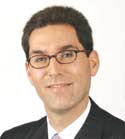Changing Perception of Industry a Priority for AdvaMed
March 1, 2008
NEWS TRENDS
|
The idea that slowing medical technology can help control healthcare costs is a flawed mindset, says Stephen Ubl of AdvaMed. |
AdvaMed has made several issues a priority this year, but none may be more urgent than changing the perception that medical technology is the biggest driver of increased healthcare costs.
“We still have a challenging healthcare policy environment around the world,” said Stephen Ubl, president and CEO of AdvaMed. He spoke to the media about device industry concerns during a briefing in February.
Ubl said a report by the Congressional Budget Office, “Technological Change and the Growth of Health Care Spending,” could be a threat to innovation. The report was released before the U.S. Senate Budget Committee in January.
Ubl disagreed with the report's assertion that medical technology is primarily responsible for the increase in healthcare spending. He also called its model for estimating healthcare costs flawed and questionable.
“It implies that slowing the diffusion of advances in technologies is the right approach to controlling costs,” said Ubl. “The American people will not—and should not—accept a so-called solution to the cost problem that sacrifices longer and healthier lives for slower [technological] growth and medical costs.”
Ubl suggested controlling costs by examining drivers such as poor quality and other inefficiencies. He also said that more-effective prevention measures and better management of diseases should be analyzed.
Additional Medicare legislation is anticipated this year, and AdvaMed is working with Congress and CMS to ensure that any changes will be beneficial to the device industry.
Ubl also touched on areas that AdvaMed hopes to see changes this year.
Remote monitoring. Right now, doctors aren't reimbursed for remotely interacting with a patient or a device.
Molecular diagnostic testing. AdvaMed has been working on a demonstration project for incorporating the value of such new tests. Ubl thinks molecular diagnostics has a good chance of being included in Medicare legislation this year.
Imaging. Reimbursement cuts could be part of the Medicare package.
Hospital inpatient prospective payment system. There will be a key rule addressing charge compression, according to Ubl, who said the current inpatient rate is distorted.
Patents. As patent reform talks heat up, AdvaMed has been working with committee leaders and has planned advocacy in key states.
Global environment. Issues include partnering with local associations in countries to demonstrate the value of technology, foreign reference pricing, and the harmonization of emerging regulatory systems.
Despite the potential obstacles that Ubl discussed, he feels that 2008 is a year of tremendous promise. AdvaMed can move forward with its Medicare agenda on issues such as remote diagnostics, and the group is also building the foundation for innovation and improving reimbursement in foreign markets. The association will continue to broaden the reach of its industry-standard code of ethics.
Copyright ©2008 Medical Device & Diagnostic Industry
About the Author(s)
You May Also Like


.png?width=300&auto=webp&quality=80&disable=upscale)
